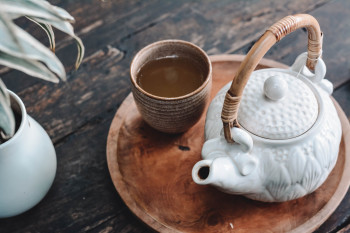Can Licorice Or Alfalfa Affect Birth Control Pills?
In our latest question and answer, our pharmacist discusses whether or not licorice or alfalfa can affect birth control pills.

Question
Hello. I recently bought a super green powder that contains alfalfa and licorice root. While I was reading, I saw those herbal supplements affect birth control pills. Is this right?

Answered by Dr. Brian Staiger, PharmD
Medical Content Reviewed By HelloPharmacist
Staff
Last updated Jul 03, 2025
Key points
- Studies show that both alfalfa and licorice may have mild effects on estrogen levels in the body.
- There is no evidence to suggest that alfalfa and licorice reduce the effectiveness of oral birth control pills or the progestins contained in birth control pills (the component primarily responsible for the contraceptive effects).
Answer
Hi Jamie! Thanks for reaching out to us.
While both alfalfa and licorice have been linked to mildly affecting estrogen levels, there is no evidence to suggest that they reduce how well birth control pills work. There is also no evidence to suggest that alfalfa and licorice influence the progestins contained in birth control pills, which is the drug component in these pills that is most important when it comes to its contraceptive effects.
Oral birth control pills come in two types:
- Progestin-only (also known as 'mini-pills')
- Combined hormone pills (which contain both an estrogen and a progestin)
A progestin is contained in all oral birth control pills and works as a contraceptive by:
- Inhibiting ovulation
- Thickening the cervical mucus
- Causing changes to the lining of the uterus
While the estrogens contained in birth control pills help to reduce certain symptoms of menses (e.g. cramping, and bloating) and can make missing a dose more forgiving, they are not necessary for the contraceptive effects.
Additionally, the amount of licorice and alfalfa contained in powdered dietary supplements (like Macrogreens) is generally far less than what studies utilize to analyze their effects on estrogen.
So, overall, even though licorice and alfalfa may mildly influence estrogen levels in the body, it is unlikely that they make birth control pills less effective.
I discuss licorice and alfalfa in more detail below.
The Effect Of Licorice On Estrogen
 Licorice is a commonly used dietary supplement, for a number of different indications, including upset stomach, stomach ulcers, dermatitis, cancer sores, and menopausal symptoms.
Licorice is a commonly used dietary supplement, for a number of different indications, including upset stomach, stomach ulcers, dermatitis, cancer sores, and menopausal symptoms.
Licorice naturally contains glycyrrhizin, or glycyrrhizic acid, which has been linked to causing low potassium levels in some individuals (this is something that FDA has warned about). Most licorice dietary supplements are processed to remove the glycyrrhizin though, which results in a product known as DGL (deglycyrrhizinated licorice).
Licorice appears to have complex effects on the body as it relates to estrogen. Most studies suggest that it can both have estrogenic and estrogenic effects, albeit mild, depending on the dose taken, and the site of action in the body. One such study stated the following:
Our findings illustrate that the multiple flavonoid components in licorice root extracts have selective estrogen receptor modulator or SERM-like activity that could function as mixed estrogens and antiestrogens to different degrees in different target tissues.
Licorice also appears to decrease testosterone production too, to a degree, in both men and women.
Based on what preliminary studies have shown, licorice could theoretically increase or decrease the effects of estrogen therapy, but there is a lack of data here to make definitive conclusions. As mentioned, however, no studies have shown that licorice decreases the contraceptive efficacy of birth control pills and it doesn't appear it affects the progestin component either.
The Effect Of Alfalfa On Estrogen

Several different parts of the alfalfa plant are used in dietary supplements, for a variety of medical conditions, including stomach cramps, arthritis, asthma, and diabetes.
Unlike licorice, which seems to interact with certain estrogen receptors in the body, the alfalfa plant itself actually contains estrogen, known as a phytoestrogen. Specifically, it contains the phytoestrogen coumestrol. Alfalfa also does appear to affect some estrogen receptors as well, just like licorice.
There have been no studies evaluating whether or not alfalfa affects birth control pills. However, it appears that alfalfa only affects estrogen levels in the body to a very mild degree and there is nothing to suggest it affects the progestins in birth control pills.
Final Words
Thanks again for reaching out to us!
It can be really difficult to give a definitive 'yes' or 'no' answer when it comes to potential drug interactions with dietary supplements simply due to the lack of studies on the matter.
Based on the data I could find, an interaction between alfalfa, licorice, and birth control pills seems unlikely. Nevertheless, due to the very real consequences of an unplanned pregnancy, it may be prudent to avoid the combination until we have a more concrete idea of how they all interact.
References
- Analysis of coumestrol, a phytoestrogen, in alfalfa tablets sold for human consumption, PubMed
- Estrogenic activity of herbs commonly used as remedies for menopausal symptoms, PubMed
- Effects of prolonged ingestion of graded doses of licorice by healthy volunteers, PubMed
- Licorice reduces serum testosterone in healthy women, PubMed
- Estrogen-like activity of licorice root constituents: glabridin and glabrene, in vascular tissues in vitro and in vivo, PubMed
- Licorice Root Components in Dietary Supplements are Selective Estrogen Receptor Modulators with a Spectrum of Estrogenic and Anti-Estrogenic Activities, PubMed
-
 Dr. Brian Staiger, PharmD
Dr. Brian Staiger, PharmD
- 3491 views


